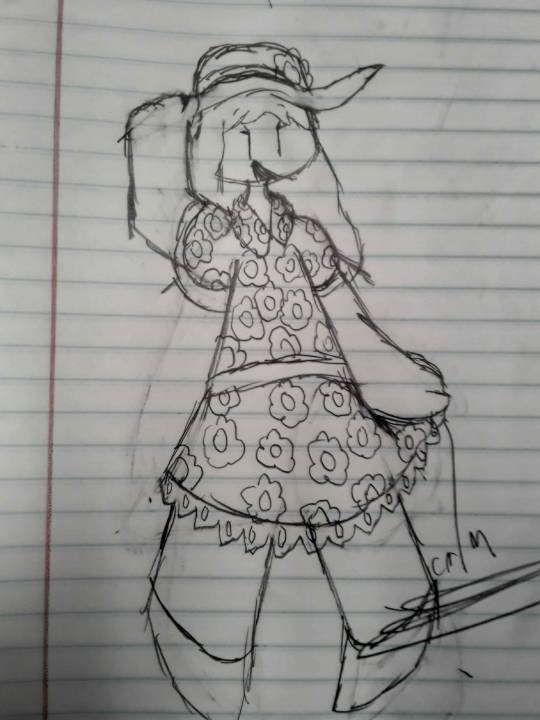#False Miracles
Explore tagged Tumblr posts
Text
Pride Month Art 2025
Hi all! Happy pride month. I drew some of my characters to commemorate! The canvas is so much bigger than last year's, lol

#false miracles#true intentions#crimium art#art#artists on tumblr#my art#my ocs#lgbt pride#gay pride#lesbian pride#bisexual pride#trans pride#non binary pride#asexual pride#agender pride#I wanted to go all out this year bc i feel like due to recent cirumstances queer ppl may feel more unsafe this year than usual#stay strong everyone! even when it feels like the worlds against us that will never stop us from being who we are <3
2 notes
·
View notes
Text
Did someone order a Sebastia Character Sheet?! No? Posting it anyway!

This is one of 2 :3 ty @foressfaction ❤️
#creepypasta#creepypasta hcs#creepypasta characters#creepypasta fandom#seireitonin#creepypasta headcanon#crp#ticci toby#janethekiller#sebastiaxticcitoby#sebastiacreepypasta#creepypasta oc#creepypasta original character#creepypasta comic#false miracles comic#falsemiracles#original character#character sheet#sebastiaxjanethekiller#sebastia#crp fandom#crp oc#crp fanart
146 notes
·
View notes
Text

here i am again
#we're living silver miracle all over again#his disaster gay bleached platinum self escaped my clutches and now his false demon king ruiner of marriages is doin it agAIN#my contracts are ripped and scattered across the ground#i don't have a high enough charm stat to pull eiden. i am in shambles#SIR AOOPPLEASE SWISH UR FEATHER BOA IN MY GENERAL DIRECTION#i don't think i've ever actually watched clueless. have i? if i did i don't remember a thing about it#and yet it remains in my mind. truly. what a cultural impact#feels like i'm tossing a lasso into a pool of eels and the eels are all eiden and they're just slipslappin out of my ineffective tool usage#lasso can't even break the surface tension of the water. what am i doing#journey to a nu world#nu carnival eiden
38 notes
·
View notes
Text
I am begging whoever or whatever field is in charge of this to change the name of this anti-Semitic Medieval trope of conversion narratives to something that is not "the miracle of the Little Jewish Boy"
#or maybe this is just an original from this author i don't know this isn't my area of study but like PLEASE#it's a good chapter i'm enjoying it and it's really interesting#you just. just. just. idk man. like. could you call it something else. idk#perce rambles#(the name is referring to the trope itself - e.g. miracle as in miraculous conversion which is a common trope i guess??)#(i don't know i don't go here AT ALL but essentially it's something about a jewish boy miraculously being converted to christianity)#(which is not an real story it's a story being written by and for christian audiences mostly hence the strong antisemitism)#^ sorry these are not good and wise tags i will know more by tomorrow but as i said i am venturing in strange lands atm#i could be lying to you this could all be false
5 notes
·
View notes
Text
mikage idealizes the past he spent with tokiko and mamiya but he can't even remember mamiyas face correctly anymore. god.
#rgu#i think his memories being magically manipulated is a valid read#but you know how false memories in rgu tend to show shadows instead of the actual people involved?#perhaps his desperation to stay in that memory is so extreme that he would let anyone fill in that shadow with their image#perhaps he himself is retroactively filling those memories with an image of dios. perhaps he himself sees anthy in her guise#and says to himself ah. of course thats what mamiya looked like all along#how could i forget?#pictures are nothing when what you believe to be the person himself stands in front of you!#mamiya set the fire. mamiya is alive. mamiya is standing next to him with green eyes and lavender hair. mamiya can be eternally preserved#it is impossible for him to wither and fade. mikage just has to believe in that miracle.
37 notes
·
View notes
Text
horror film where one of the group dies early and then rejoins completely fine and happy and everyone knows it isn’t them but nobody has the will to get rid of them
#like the horror of clinging for comfort to something you know to be false but you can’t bring yourself to banish it#and the horror of seeing someone you love act oddly and in the moment you can’t deny that it isn’t them#and it’s with you and it means harm#but it’s waiting and watching and maybe picking people off#but you can’t get rid of it. not in the hopes that maybe. MAYBE. by some miracle it is that person?#this is an avenue i feel like zombie films should explore more#gaz speaks
0 notes
Text
Mandela's Leftovers Vol. 1 - False Miracles
Merry Christmas, everyone! Today I have a special gift to share.
Today, I'd like to go over some of the unused, extra, and prototype content that I made for my game, False Miracles. Think of it as sort of a look-back on everything I've done this year.
Well, let's get started!
Concept Art / Character Concepts
Aero
Aero was the first character I ever designed specifically for False Miracles. He was meant to be a personification of the Frutiger Aero aesthetic, specifically inspired by Windows Aero design from Vista/7.

This was the first drawing I made of Aero, for a discord server art contest. I drew this around the time I was still making Aquatopia, so my art style was a bit different.

This is the rough sketch of their cut-in portraits. I decided to give him a more silly atmosphere, so I give them that :3 face, lol. Also, some people have said that his shoes look like crocs. That wasn't intentional, but perhaps I'll roll with it if it's the majority opinion.
Adrian Pélagique
I designed Adrian after I designed Aero. Frutiger Aero as an aesthetic often portrays both technology and aquatic life. While Aero was the technological side of things, Adrian was meant to represent the Aquatic aspect of it.

This is a drawing I made of him on a school whiteboard around the time I was developing the demo. He's probably my favorite to consistently draw.

This is the sketch of his cut-ins. It was also the drawing where I designed him. For many of the characters, I was improvising their design while drawing their cut-ins. At this point, Adrian did not have a color-scheme yet.
Þ (Thorn)
Thorn was designed after I designed Adrian. Another aspect of Frutiger Aero is nature and plants. So, Aero, Adrian, and Thorn are kind of like the Fruitger Aero personification trinity, lol.

This is a drawing I did of Thorn recently, I imagine this is her casual attire, when she's not gardening. Her fashion sense is inspired by my grandma.

And, her cut-in rough sketches. Like Adrian, her design was created on the spot.
Nisali Adriel
Unlike the last few characters, Nisali is not inspired by the Frutiger Aero aesthetic, because she's actually a character I created long before I created False Miracles, for a Dungeons and Dragons campaign. I still play her as a character in D&D regularly, actually!

This was the earliest design I could find for her, from a character sheet from around 2021-2022? Her design and clothes are quite different. Note she doesn't have her wings. If I remember correctly, they used to be retractable?

and here's the sketches of her final design. This is also the design I use in D&D campaigns where I play as her. Quite a bit has changed!
Onyx "Roadkiller" Schäfer
While Roadkiller isn't necessarily inspired by Frutiger Aero, they still have that 2000s air to them, and I think that aids the game. I wanted to design a character of rebellious nature, taking inspiration from alternative fashion.

I believe this is the first proper drawing I made of them. Not much changed from this and their final design, although they did not have a color scheme yet.

This is the cut-in rough sketches. I notice that I left some of the details that required line-less art out of the rough sketch, so I could do it later. I also had their tongue out in their boss attack pose, but got rid of it for some reason. I don't remember why lmao
Skyler Woods
People who've been following me for a while probably knew about this character before False Miracles. I featured them as the main character of an old album of mine called "Into the Woods" which is very old now, lol.

Some old art I made of them in like, 2022? Meant for a sequel album to Into the Woods that I never ended up making.

Eventually I repurposed them for False Miracles as a sort of tribute to my old work. I also like them as a character, and wanted to use them more. Perhaps they can appear in all my work as a sort of sign that what you're looking at is made by me, or something.
Other / Misc

The sketch I made for Magu's sprite. Magu is a guest character, and was created by @d6ggyb0x. So if you want more of Magu, go follow him!!

This is art of Skyler and Thorn when they were younger. I'd imagine this is what they looked like in High School.



Originally, I wanted there to be alt-color palettes for you to choose from. These are ones I made for the demo, that I never ended up implementing.
Unused Assets
These are graphics that I planned on using in-game, but never did.
Unused Achievements



These are icons for achievements that I never ended up implementing due to time constraints. The first one was for clearing all Story Mode routes, and the other two were for clearing a match without using lives or bombs.
Unused Border

Originally, I wanted to include mini-games or something like that, sort of like Plants Vs. Zombies. This would've been the graphic used for those, since you wouldn't be competing against a CPU in some of them. This was scrapped pretty early on, because I thought it might've been too much of a task to implement. Maybe I might try something like this in the future.
Unused Staff-roll images


These were two graphics I wanted to use in the staff roll. Instead of the scrolling city, I wanted this image to pan from the grass up to the sky. It's a picture I took myself, but when I tested it out, the image quality was too low when zoomed in. So I never used it. The ball would've bounced around the screen, but I threw it out because I thought it might be too distracting.
Unused Music
These are songs that I wanted to be in the game, but I threw out before release.
*Note: The songs you hear were originally composed in Online Sequencer, but were remade in LMMS like the other songs to be accurate to the final version of the game.
Aquarium ~Vibraphone Version~
This was an unused version of Adrian's theme. The version you hear in game would've played normally, but when Adrian sent over a boss attack, it would switch to this version.
This would've been a cool concept, but ultimately with how limiting Scratch is as an engine, would've been a nightmare to implement. So I didn't use it.
Photosynthesis
This was originally meant to be Thorn's theme. When I was first creating Thorn as a character, I imagined her with a more bratty, childish attitude, but as I started designing her more and more and started writing for her, she changed to a more motherly, optimistic and friendly character, so ended up making a new theme for her. This one is okay, but in retrospect, I'm kind of glad I never used it. I think Serenity fits Thorn much better.
Looking back on this year, I'm really happy with how much I was able to accomplish this year. There were times where I thought I would never even finish this project, but I'm glad I did it. Thank you so much for sticking around. Happy Holidays, and I hope you have a Happy New Year!!
-Crimium
4 notes
·
View notes
Text
Sebastia cosplay:3





Had sm fun bringing my creation to life :3
#creepypasta#creepypasta hcs#creepypasta characters#creepypasta fandom#seireitonin#creepypasta headcanon#crp#sebastiacreepypasta#creepypasta oc#creepypasta original character#false miracles comic#falsemiracles
87 notes
·
View notes
Note
16 19 22 23 24 34 35 60 🏒
16 - vancouver - kingfishr (vibes wise i do like mitch for this. however as my official answer this has to be barky i would end up on the news if this is how i manifested a mm16 canucks trade)
19 - loser, baby - hazbin hotel soundtrack (dylan strome <3)
22 - i love you, i'm sorry - gracie abrams (dew1 (sorry))
23 - the black dog - taylor swift (mac t (he's got that dawg in him)
24 - land where i land - novo amor (dew2 (SORRY))
34 - close enough to feel you (am34)
35 - us. feat taylor swift - gracie abrams (sammy (and i do i do miss him))
60 - family tree - ethel cain (woll)
#THAT NIGHT YOU WERE TALKING FALSE PROPHETS AND PROFITS THEY MADE IN THE MARGINS OF POETRY SONNETS YOU NEVER READ UP ON IT SHAME COULD HAVE L#EARNED SOMETHING ROBERT BLY ON MY NIGHTSTAND GIFTS FROM YOU HOW IRONIC THE CURSE OF A MIRACLE HERSE OR AN ORACLE YOURE INCOMPARABLE FUCK IT#WAS CHEMICAL YOU! PLUS! ME! WAS! US!!!!!!!!!!!!!!!!!!!!!!!#sorry this has been day gets upset about the ilya samsonov trade dot jpeg
1 note
·
View note
Note
I'm so fascinated by ghost's first meeting. "Ah yes this robbery looks interesting, Imma join in and get some too bc no one will realize... I'm not supposed to be here... Wait why is that guy calling me out..." lmao
thats p much exactly how it went lol. ghost kinda just joined in because they were in the area and were just sooo used to being able to just kinda wander into situations without being acknowledged that when badger called them out (AFTER the heist was over btw) they were like. WUH. HUH????
#ask and ye shall receive#anonymous#petty crimes crew#also the fact that theres not one but TWO people who are completely immune to the false normalcy in the crew is like a statistical MIRACLE#its like completely random and not based on any like specific mutation or genetics or whatever#it just super rarely doesnt work at all on some people
1 note
·
View note
Text
I'm gonna be so real rn if weed (or ANY substance for that matter) is making it so you're too intoxicated to do basic hygiene upkeep of both yourself and your living space, you may need to reassess your relationship with it. It may not chemically cause addiction like nicotine or other chemicals in recreational drugs, but your brain can become dependent on anything
#sincerely someone who is tired of hearing people cite “it's not addictive tho” while their quality of life is visibly deteriorating#listen being high is great and fun i enjoy it on occasion but I've lived with too many people who heard that it isn't addictive the way that#stuff like cigarettes alcohol and meth are and decided that meant they didn't need to worry when signs of dependency started cropping up#it effects everyone differently. I'm just sick of people being given a false sense of security that it's some miracle drug with no negatives
0 notes
Text
Thinking of them…. Sebastia and Toby my favorite unstable couple
sebastia x toby
basically sebastia having a mental crisis


i still don't know how to use tumblr bruh
@seireitonin
#creepypasta#creepypasta oc#seireitonin#sebastiacreepypasta#ticcitoby#sebastiaxticcitoby#creepypasta original character#false miracles comic#falsemiracles#creepypasta fandom
77 notes
·
View notes
Text

Who is the False Prophet of Revelation?
Eli Kittim
Binary Patterns
The Bible often uses binary patterns by introducing two important figures who turn out to be one single individual. For example, a binary pattern can be seen in the Old Testament’s (OT) presentation of the two Messiahs in Judaism: one is a high priest, the other is an anointed king of the Davidic line (cf. Zech. 4:14). The two Messiahs can also be found in the Apocryphal literature, such as in the Testaments of the Twelve Patriarchs and the Damascus Covenant. However, in the New Testament (NT), these two Messiahs are morphed into one priestly/kingly figure: Jesus, the Son of God (cf. Heb. 4:14 and Mt. 2:1–2).
The same is true of the two witnesses in the NT. In order to understand the identity of the two witnesses in Rev. 11:3-12, we must first trace them back to the Hebrew Bible from which they emerge (Zech. 4:14). So when we trace the identity of the two witnesses back to the OT and the context in which they appear, we find that they represent the two Messiahs of Rabbinic Judaism. But these two figures later became coalesced, commingled into one, in the figure of Jesus Christ, who’s given the titles of king and high priest in the order of Melchizedek, who is also a king and priest (Heb. 7:13-17). Therefore, the two witnesses appear to represent the coming Messiah: Jesus Christ (cf. Mal. 4:5; Rev. 6:2)!
The Earth & the Sea
First Jn 5:6 uses the symbols of “water and blood” to represent the divinity and humanity of Jesus, thus indicating that he’s both God and man. The “water” symbolizes the divinity of Jesus, while the blood symbolizes his humanity. Thus, water symbolizes the spirit, while blood symbolizes the flesh.
Now let’s look at the serpent of Gen. 3, which is later identified as the devil or Satan, who is also known as “the great dragon.” Revelation 12:9 says that he will be incarnated on earth:
“And the great dragon was thrown down,
that ancient serpent, who is called the devil
and Satan, the deceiver of the whole
world—he was thrown down to the earth,
and his angels were thrown down with him.”
Isaiah 27:1 alludes to the “the spiritual forces of evil in the heavenly places” (Eph. 6:12) by portraying their ruler (i.e. the serpent/dragon) as residing “in the sea”:
“In that day the LORD with his hard and
great and strong sword will punish
Leviathan the fleeing serpent, Leviathan the
twisting serpent, and he will slay the dragon
that is in the sea.”
Just as 1 Jn 5:6 uses the symbols of “water and blood” to represent the spiritual and human domains, so the description of the two Beasts in Rev. 13—-one “rising out of the sea,” the other “out of the earth”——may be used in a similar fashion to describe the spiritual and earthly realms, respectively. In other words, the reference may be to a single individual who possesses two natures: a human & a spiritual one. Let’s not forget that in heaven, within the Throne Room of God, a sea is explicitly mentioned in Rev. 4:6 (cf. Gen. 1:7).
The Unholy Trinity
According to Rev. 13:4, the whole world “worshipped the dragon which gave power unto the beast” (i.e. the Antichrist). Yet notice that the second Beast (i.e. the False Prophet), who came out of the earth mimicked Christ because he “had two horns like a lamb … [but] spoke like a dragon” (Rev. 13:11). The point is that just as the two messiahs and the two witnesses represent one person, so the False prophet and the Antichrist may be one and the same person as well. The Book of Daniel doesn’t mention two Antichrists but rather one, namely, the “little horn” (Dan. 7:8; 8:9-12).
First Jn 4:1 associates false prophets with unclean spirits which have been unleashed in the world. Rev. 16:13 reads:
“And I saw, coming out of the mouth of the
dragon and out of the mouth of the beast
and out of the mouth of the false prophet,
three unclean spirits like frogs.”
The Dragon, the Beast, and the False prophet seemingly represent an unholy Trinity in which these three persons are one being, just like the Holy Trinity represents one being, not a plurality of beings. The Devil, the Beast, and the False prophet appear to be three manifestations or three modes that represent Satan, his spirit, and his incarnation.
False prophets in the OT
Surprisingly, we don’t find the phrase “false prophet” in the OT, but there are nevertheless references to many false prophets. The Septuagint (LXX) talks about the priests and the false prophets (ἱερεῖς καὶ ψευδοπροφῆται), and often links them together. The term ἱερεύς in this context refers to a priest, one who offers sacrifices to a god, an idol, or an evil spirit. So the LXX suggests that the false prophets are priestly insofar as they encourage the worship of idols (cf. Zech 13:2). Jeremiah 34:9-10 (LXX) associates false prophets with divination, enchantments, clairvoyance, dreams, sorceries, and with lies. Similarly, in the NT, false prophets are magicians, sorcerers, & illusionists (cf. Acts 13:6). This is reminiscent of 2 Thess. 2:9-11 in which the Antichrist “will use all sorts of displays of power through signs and wonders that serve the lie.” Likewise, in the Hebrew Bible, the false prophets are prophesying lying wonders and working miracles (see Exod. 7:8-13; Jer. 6:13). In the NT, they even rise from the dead (Rev. 13:3) and perform “great signs, even making fire come down from heaven to earth” (Rev. 13:13) in order to deceive if possible even the elect (Mt. 24:24).
False Prophets in the NT
Both Mt. 7:15 & Mt. 24:11 warn that there will be many false prophets (ψευδοπροφῆται) who will deceive the world. Matthew 24:24 speaks of false Christs (ψευδόχριστοι) and false prophets who perform “great signs and wonders.” Second Pet. 2:1 associates false prophets with false teachers who secretly introduce destructive heresies, even those that deny Jesus’ lordship. Similarly, 1 Jn warns of deception and commands Christians to “test the spirits to see whether they are of God; for many false prophets have gone out into the world. … This is the spirit of antichrist” (1 Jn 4:1–3). Thus, false prophets have the spirit of Antichrist. The apostle Paul calls them “false apostles” (2 Cor. 11:13) and “false brothers” (Gal. 2:4).
The most notorious false prophet in the Bible is the one referenced in the Book of Revelation. In Rev. 19:20, the signs that the False prophet performs in the presence of the Antichrist may be analogous to the signs that Jesus performs in the presence of the Holy Spirit who anoints him with power (see Lk 4:18; Acts 10:38). In fact, the relationship between the False prophet and the Antichrist seems to be analogous to the relationship between the first and second person of the Trinity in which the Word is not only with God but the Word is God, meaning that the Word & God are one and the same (see Jn 1:1). Thus, the reference to the Devil, his son (the Antichrist), and the unclean spirit (personified in the figure of the False prophet) may signify an unholy trinity of three persons who nevertheless share one being (Rev. 16:13). Let’s not forget that the great dragon——“that ancient serpent, who is called the devil and Satan”——is thrown down to the earth and takes the form of a man, as mentioned in Rev. 12:9. And just as Jesus, who is God incarnate, is called a prophet in Mt. 21:11, so the dragon, or Satan incarnate, may be dubbed the False prophet in Rev. 16:13. Matthew 7:15 warns of false prophets who come in “sheep’s clothing,” but who are “ferocious wolves.” This is echoed in Rev. 13:11 where the second Beast (False prophet) looks like a lamb but speaks like a dragon.
Conclusion
Curiously enough, it’s the False prophet who works miracles, not the Antichrist. But if the Antichrist is far more important, and if the False prophet is subordinate to the Antichrist, surely the Antichrist must have more power than him. Yet, in the Bible, the opposite seems true, which doesn’t make any sense. That’s why it seems far more plausible that they are one and the same person, just like the two witnesses and the two OT messiahs are one and the same person. So, the reference to the two beasts from the earth and the sea may be an allusion to a single individual who possesses two natures: a human & a spiritual one. Notice also that the second beast is not mentioned until after the resurrection of the first beast, “whose mortal wound was healed” (Rev 13:12), “and has come to life” (Rev 13:14). In other words, the second beast may simply represent the first beast after his resurrection. Therefore, it seems far more plausible to assume that the False Prophet is the Antichrist, who is also known by many other titles, such as “the man of lawlessness,” “the son of destruction” (2 Thess. 2:3), and the "Little horn" (Daniel 7:8, 20; 8:9-12, 23-26)!
#false prophet#antichrist#Dragon#serpent#ψευδοπροφῆται#false prophets#deception#divination#magic#sorcery#little horn#miracles#signs and wonders#uncleanspirits#satan#false gods#idols#evil spirits#eschatology#elikittim#book of revelation#the little book of revelation#endtimes#τομικροβιβλιοτηςαποκαλυψης#bible prophecy#thetwobeasts#devil#ελικιτίμ#unholy trinity#themanofsin
0 notes
Text
100 Verses About Deception By Satan In Last Days
1 Timothy 4:1 Now the Spirit expressly says that in later times some will depart from the faith by devoting themselves to deceitful spirits and teachings of demons, Matthew 24:24 For false christs and false prophets will arise and perform great signs and wonders, so as to lead astray, if possible, even the elect. 2 Corinthians 11:13-15 ESV For such men are false apostles, deceitful workmen,…
View On WordPress
#armageddon#deceitful#deception#demons#false christ#false prophet#last days#lies#miracles#Satan#teachings#wonders
0 notes
Text
Info on my Next Project - True Intentions
Hi everyone! It's Crim.
It's been quite a while, no? False Miracles released almost a year ago now, and it's been quite the journey since then.
I've had some people ask me what's next after False Miracles, or if the game will get a sequel. And I'm happy to report that I'm finally able to make a formal announcement about it.

2nd Project CREDIBILITY - True Intentions
This game is meant to be a sequel to False Miracles. It's fairly similar to the last game, but with a nice amount of new content added in.
Unlike False Miracles, this game will have an overarching story. It goes something like this:
The city has been hit with an unexpected snowstorm in the middle of summer. The temperatures have also massively dropped to freezing integers. As more time goes by, the storm only gets worse and the temperatures get lower. It won't be long before it gets to cold for anyone to survive. Who or what is the cause of this unnatural blizzard?
Here's some screenshots:





For the last game, I was inspired by the Frutiger Aero aesthetic. So this time, I decided to base the game around a different aesthetic: Y2K Futurism. It gives the game a subtly different feel, and makes it feel slightly more serious.
The trial version will have 6 playable characters. Aero, Adrian, and Thorn from False Miracles, and three new characters that have not been revealed yet.
I can't guarantee an exact release date yet, but expect the trial version to come out sometime in March.
As usual, it'll be available on my Itch.io page when the time comes.
Well, that's about it for now. Stay tuned for more information, and I hope you look forward to it!
2 notes
·
View notes
Text
AHHH SHE LOOKS INCREDIBLE YOUR ART IS AMAZING TY!!!



Sebastia FalseMiracles Fanart
(I hope you like it) @seireitonin
#creepypasta#false miracles comic#crp fandom#creepypasta oc#creepypasta comic#creepypasta characters#sebastiacreepypasta#seireitonin
118 notes
·
View notes